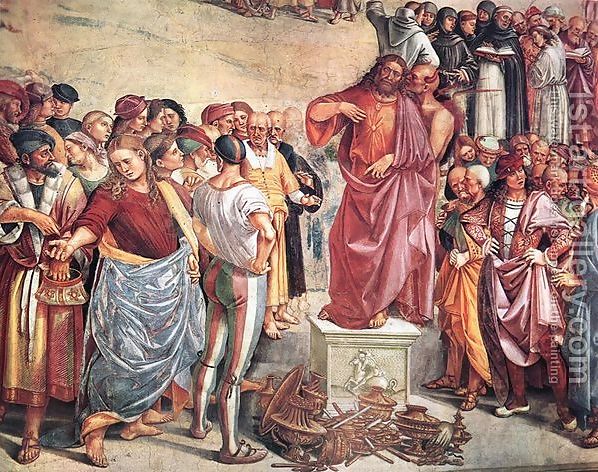
by Bret Capranica | Aug 20, 2009 | Biblical Studies, Eschatology, Featured Articles
Final thoughts on the antichrist from 2 Thessalonians 2. Intro & Part 1 His Revealing Brings His Undoing (v 8 ) Only when the restrainer is removed will the “mystery of lawlessness” or the man of lawlessness be revealed. The removal of the restrainer brings the revelation of the antichrist. Paul did not believe that his day was that day. In fact, whoever this man of lawlessness is, he will be personally undone by the coming of Jesus Christ who “will slay [him] with the breath of His mouth” (Revelation 19:15, 19-21 – the terminology is very similar). His Deception is Energized by Satan (v 9a) The coming of the man of lawlessness is connected directly to the activity of Satan. His actions are not merely parallel to those of Satan’s. The terminology suggests that his actions are the working, energy, power, and very activity of Satan himself. Satan runs the show with this man as his puppet (Revelation 13:2). His Deception is Exalted by Signs (v 9b). The primary tools of the antichrist are signs and false wonders; two elements connected together: miraculous displays of supernatural power (Matthew 24:24). These are truly supernatural abilities. His miracles and supernatural signs are reminiscent of those performed by Jesus and the apostles of the 1st century. This is far more than world-wide influence or electoral skill. This man publicly appears to be supernatural. His Deception is Embraced by Sinners (v 10) This man of lawlessness will possess the power to be overtly wicked and still convince people that his actions are God-centered. What is fascinating is that the text indicates that...

by Bret Capranica | Aug 19, 2009 | Biblical Studies, Eschatology, Featured Articles
Continuing my thoughts from yesterday’s post: What are the characteritics that comprise the man of lawlessness, or the one we would commonly refer to as the Anti-Christ? He Comes with Apostasy 2 Thess 2:3 says, “Let no one in any way deceive you, for it will not come unless the apostasy comes first, and the man of lawlessness is revealed, the son of destruction” (italics in in the NAS). The apostasy here appears to be something quite definite, not merely a period where some are deliberately abandoning the faith, but a definite time where such abandonment tends to characterize the culture so significantlythat it is “the apostasy.” The construction of verse 3 gives the indication that the apostasy and the revelation of the man of lawlessness are closely related to one another. While we may live in a climate ripe for apostasy – while Paul no doubt saw examples of apostasy, the apostasy spoken of here is directly connected to the revelation of the man of lawlessness and is a reason Paul gives for why his own era was not connected to the day of the Lord – the day of God’s wrath. He is Characterized by Disobedience and Destruction His title is a man of “lawlessness;” he is disobedient to God’s instructions. He refuses to be ruled by God (1 John 3:4). “Son of destruction” is a Hebrew idiom to speak of the chief characteristic of this man: destruction. Not that he merely produces destruction, but I think this really describes his ultimate future. Destruction is his doom. He is the one who will be given over to...

by Bret Capranica | Aug 18, 2009 | Biblical Studies, Eschatology, Featured Articles
In spite of the hermeneutical difficulties of the recent Obama-Antichrist video, I am still one who believes in a futuristic coming of a man who we could describe as “The Antichrist.” Perhaps in some circles, such a notion is worthy only of matching historical events with a 1st century villian. I still believe the world will see such a person. Let me also state before going any further. The issue of eschatology is not foundational to fellowship with me. In fact, someone could hold a very different view from mine and still be a member of our church, assuming they would be respectful of the position our leadership holds and not divisive. I have good friends (some of whom were in fact members of churches I have pastored) who think the Anti-Christ was a Roman General (Titus) or a Roman Emperor (Nero) of long ago. I disagree – and I still enjoy their company and fellowship over the gospel. Also I do not intend this blog to be a place that hounds others about their eschatological position. I’m currently preaching through a book of the Bible (Zephaniah) that I think has a lot to say in a futuristic way about eschatology, so I’m going to post a few of my own personal positions on the biblical issues surrounding the Antichrist and eschatology. If that doesn’t suit you or you are not interested in any more premillennial perspectives on what others have made millions of dollars fictionalizing, feel free to move along and read something more appealing. 2 Thessalonins 2:3-12 is perhaps one of the best descriptions of the Antichrist in Scripture. I...










